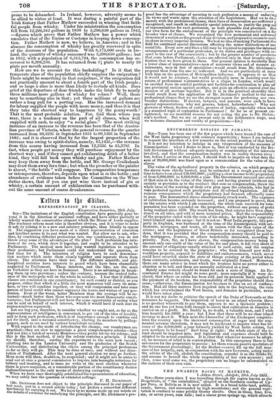ENCUMBERED ESTATES IN JAMAICA.
Sin—Tours has been one of the few papers which have treated the case of the West India proprietary with ordinary impartiality ; hence I am induced to request the insertion of a few remarks on the actual position of that body.
It is not my intention to indulge in any vituperation of the measure of Emancipation : what I desire to show is, that it was conducted by the Bri- tish Government without adequate inquiry or consideration of the interests involved, and that the compensation-money. was in reality thrown *may : but, before I arrive at that point, I should wish to inquire on what data the sum of 20,000,000/. was fixed uppn as a remuneration for the value of the slaves.
The value of the agricultural property in the colonies, on whichproperty
the slaves were chiefly located, may be estimated at a rough guess at that time to have been about 120,000,000/., yielding a clear income to the proprietary of from 6,000,000/. to 8,000,000/. a year. The Government assumed one-sixth of that sum to be the value of the slaves ; and having granted (without any
anxiety or provision as to the residue) that sum as compensation, threw the whole onus of the working of their own plan upon the colonists, who had in vain protested against such precipitate and ill.advised legislation. All the ruinous consequences which the proprietary had foreseen effectually came to pass. The manumitted slaves simultaneously struck work. The expenses of cultivation became seriously increased ; and I am prepared to prove, that on the estates with which I am connected, the whole sum received for com- pensation has been expended on the properties, without one penny of profit being realized since 1838. The result has been, that estates have been aban- doned on all sides, and sold at mere nominal prices. Had the responsibility of the proprietor ended with the ruin of his estate, he might have congratu- lated himself upon his escape : but it is not so: West India property, like pro- perty in England, was burdened at the time of the Emancipation with set- tlements, mortgages, and trusts, all in unison with the then value of the estates; and the Legislature of Great Britain so far recognized these bur- dens, that it was provided that the compensation-money should be paid to the mortgagees, trustees, or others beneficially interested, according to priority. Now, Sir, as I have shown, the compensation-money being in amount only one-sixth of the value of the fee and plant, it fell very short of the amount of obligations usually attached to each estate, and the surplus remains to be covered by the proprietor ; who finds himself now with a worthless property, exposed to liabilities and embarrassments, which never could have occurred under the state of things existing at the period when those contracts, settlements and trusts, were originally framed. Moreover, there are many estates in trust which the trustees have no power either to abandon or to sell, and these are annually cultivated at a loss. Surely some remedy should be found for such a state of things. An En- cumbered Estates Act might do some good ; more especially if it were de- clared, that where an estate has been sold and its proceeds fairly applied to the payment of its burdens, the responsibility of the proprietor should then cease,—otherwise, the Emancipation Act becomes to him an act of confisca- tion. Had all these matters been inquired into in the beginning, the ruin which has overwhelmed the West Indies, and Jamaica in particular, never would have taken place. It is not my desire to criticize the speech of the Duke of Newcastle or the
measures he suggests. The imposition of taxes in an island wherein there is no product wherewith to pay them, appears to me a Quixotic problem ; and no one has yet been bold enough to assert that cultivation in Jamaica is carried on at a profit. Mr. Barkly is, no doubt, a valuable man, and I wish him heartily his 5000/. a year; but I fear that there will be no clear island revenue to meet it. When next the Chancellor of the Exchequer congratu- lates the country upon the increased consumption of sugar and the aug- mented revenue therefrom, it may not be irrelevant to inquire what has be- come of the 6,000,0001. wyear formerly yielded by West India estates, but now nowhere to be found! Earl Grey is right; the whole state of the is- land should be inquired into, and legislation and expenses should both be adapted to its actual condition. It is clear that whatever measure be adopt- ed, no measure of relief is in contemplation. In this emergency there is but one course for the proprietary to pursue : let them remain passive spectators of the Government proceedings; let the Mother-country fill up the full mee- sure of her iniquity, and, in conjunction with the new Governor, acting under the advice of the old, abolish the constitution, remodel it as she thinks fit, and assume to herself the whole responsibility of her own measure; and then, come weal come wo, the proprietary can no longer be calumniated as the authors of their own ruin.


































 Previous page
Previous page